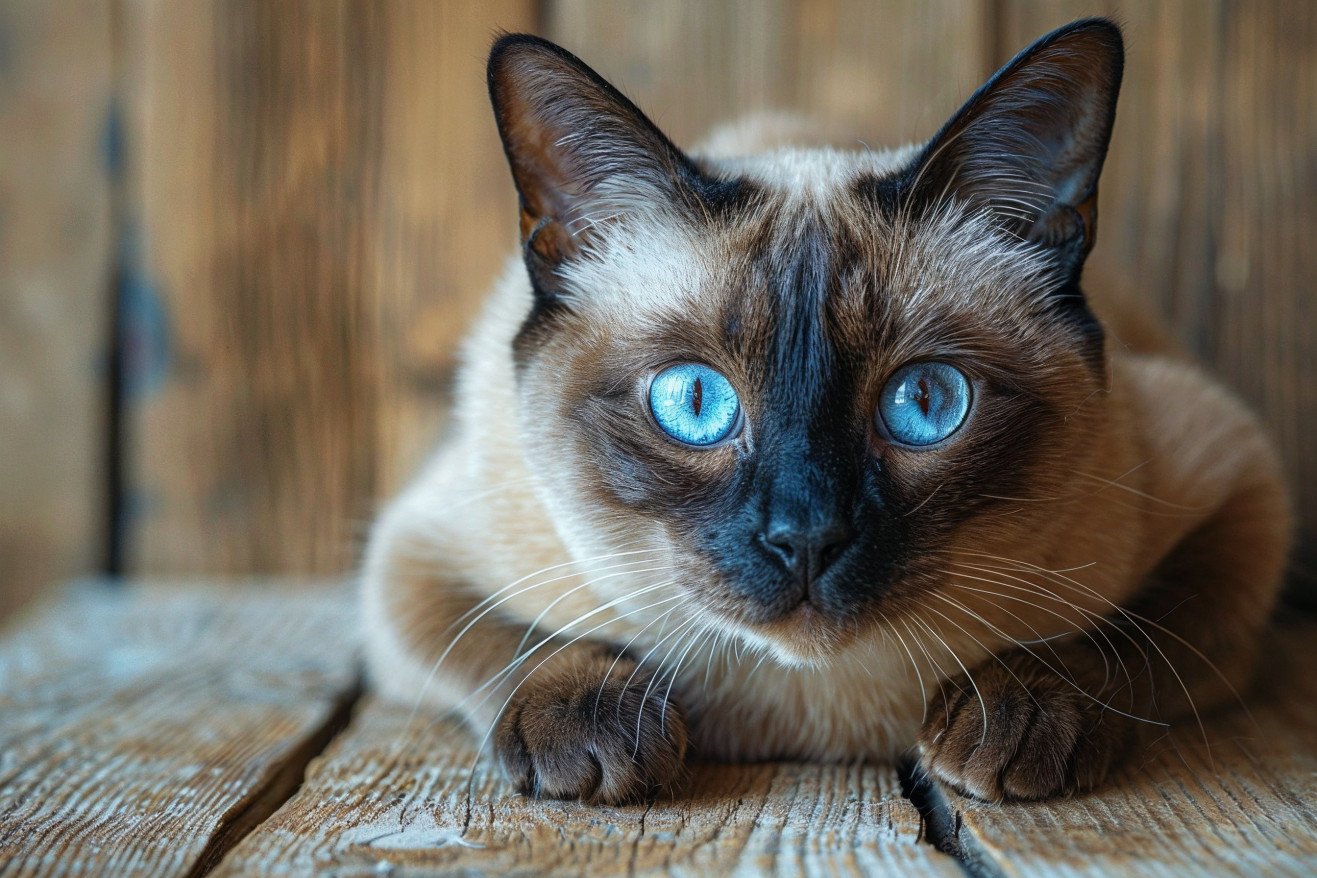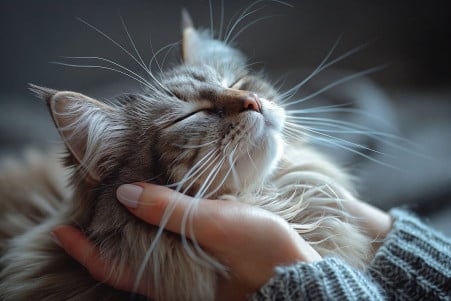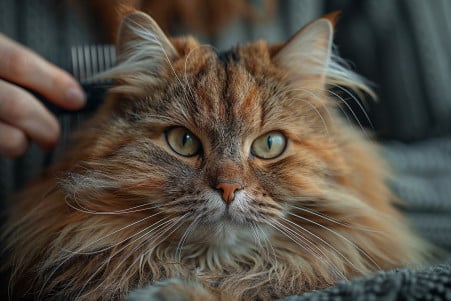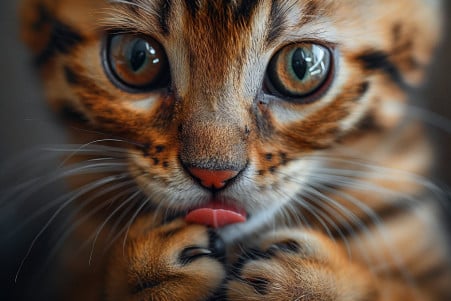Do Siamese Cats Shed? Insights from Experts
22 March 2024 • Updated 21 March 2024

While most Siamese cat owners will experience some shedding, the amount can depend on a variety of factors including the individual cat's coat, the time of year, and the cat's overall health. Siamese cats are considered to be moderate shedders when compared to other breeds. Their short, fine coat doesn't tend to shed in large clumps, but regular brushing can help keep hair around the house to a minimum.
To get a complete picture of how much Siamese cats shed, we'll look at research from veterinary scientists and professional cat breeders. This information will help explain the genetics behind Siamese cat shedding, how much they shed compared to other breeds, and the best ways to deal with shedding. After reading this article, you'll be able to decide if a Siamese cat's grooming needs will fit into your life.
Do Siamese cats shed?
Siamese Cat Shedding Cycles
Siamese cats have two major shedding cycles a year, usually in the spring and fall. This is a natural process that helps cats get rid of dead hair and distribute oils through their fur. The amount of shedding can be influenced by age, health, how often the cat is groomed, and the cat's living environment.
Studies by veterinarians have shown that shedding is important for cats to remove excess hair and make room for new hair growth. In the spring, cats shed their winter undercoat to adjust to warmer weather. In the fall, cats grow a winter undercoat to help them adjust to the colder weather.
That said, if your cat is shedding more than normal or if they are shedding at a time that is not consistent with their regular shedding cycle, it could be a sign of an underlying health problem. Causes of abnormal shedding include allergies, hormonal imbalances, parasites, diseases, stress, and nutritional deficiencies. Make sure to keep an eye on your Siamese cat's shedding and talk to a vet if you notice any unusual hair loss.
How Diet and Nutrition Impact Siamese Cat Shedding
A good, well-balanced diet can help control Siamese cat shedding. PetMD explains that a cat's diet should include the right levels of protein, fat, and omega-3 and omega-6 fatty acids to keep their coat healthy. If a cat's diet is lacking in any of these areas, it can lead to more shedding and a less healthy coat.
Pumpkin® says that feeding your Siamese cat a high-quality, nutritionally complete diet can help control excessive shedding. Cats.com also notes that while a cat's diet may be complete, supplements like cod liver oil, evening primrose oil, and fish oils can help ensure that a cat's coat is as healthy as possible and that they shed less.
That said, it's important to talk to a vet before you make any major changes to your cat's diet. They can help you figure out which food formulas and supplements will work best for your Siamese cat's unique needs and shedding issues.
Grooming Tips to Reduce Siamese Cat Shedding
Siamese cats need regular grooming to help control shedding and to keep their coat healthy and shiny. The National Siamese Cat Club explains that Siamese cats need "minimal grooming, rather than an intensive effort" because of their short, close-lying fur.
The Wildest suggests using a soft-bristle or rubber brush to remove loose hair from Siamese cats without irritating their skin. If your cat has a thick undercoat, a deshedding tool like the Andis Pet Deshedding Tool can help remove excess fur. Business Insider also recommends a self-cleaning slicker brush to remove mats and loose hair.
When brushing your Siamese, make sure to be gentle and avoid over-brushing, which can damage their unique coat color. The National Siamese Cat Club recommends using a small rubber brush carefully once a week during shedding seasons. You can also dampen your hands and rub them backward over your cat's coat to remove loose fur.
If your cat's shedding increases during seasonal changes, you may need to brush your cat more often or even give them an occasional bath. However, the National Siamese Cat Club points out that "many Siamese show cats never need a bath" and suggests using a dry cornstarch treatment instead.
With these specific grooming methods, Siamese cat parents can help control their cat's shedding and ensure their pet always looks their best.
Hypoallergenic Siamese Cats
While no cat is completely hypoallergenic, Siamese cats are often listed as a good option for people with allergies. Per Cats.com, Siamese cats have lower levels of the Fel d1 protein that causes allergic reactions than many other cat breeds. They also have shorter fur, which means they may not shed as much dander.
That said, people's reactions to cats can vary widely. PetMD explains that while Siamese cats may be a better option for people with allergies, it's still important to spend time with one to see if it causes your specific allergic reactions.
For people who can tolerate Siamese cats, MetLife Pet Insurance suggests using air purifiers, taking allergy medication, and keeping the cat and the house clean to help control allergies. Thanks to their low levels of shedding and the Fel d1 protein, Siamese cats can be a good option for people who want a cat but have allergies.
Dealing With Excessive Shedding and Other Health Issues
If you notice that your Siamese cat is shedding more than usual or shedding at odd times of the year, it could be a sign of an underlying health issue. PuAinta explains that some of the medical problems that can lead to excessive shedding in Siamese cats include skin allergies, hormonal imbalances, and parasites such as mites or fleas.
Kritter Kommunity also points out that stress can also lead to excessive shedding in Siamese cats, so it’s important to make sure your cat is in a low-stress environment. In addition, Catster mentions that hyperthyroidism and nutritional deficiencies can cause abnormal hair loss.
If your Siamese cat is shedding more than usual or shedding at odd times of the year, take them to the vet to make sure there are no underlying health issues. Regular vet visits and preventive care can help ensure that your Siamese cat stays healthy and that their coat stays in good condition. By catching any issues early, you can make sure that your cat’s shedding stays manageable and that your furry friend stays happy and healthy.
Conclusion: Can You Live With a Siamese Cat?
Siamese cats are often listed as a good option for people with allergies because they produce less Fel d1 than other breeds. In addition, Siamese cats are known to shed less, which can help reduce the amount of allergens in the home.
That said, everyone's allergies are different, and it's important to spend time with a Siamese cat to see if it will cause a reaction. If you are able to live with a Siamese cat, there are a number of ways to help reduce your symptoms, including regular cleaning, air purifiers, and medication.
While no cat is truly hypoallergenic, the Siamese's lower levels of shedding and Fel d1 make them a good option for the right person. With the right precautions, Siamese cats can be a good option for people with allergies.


